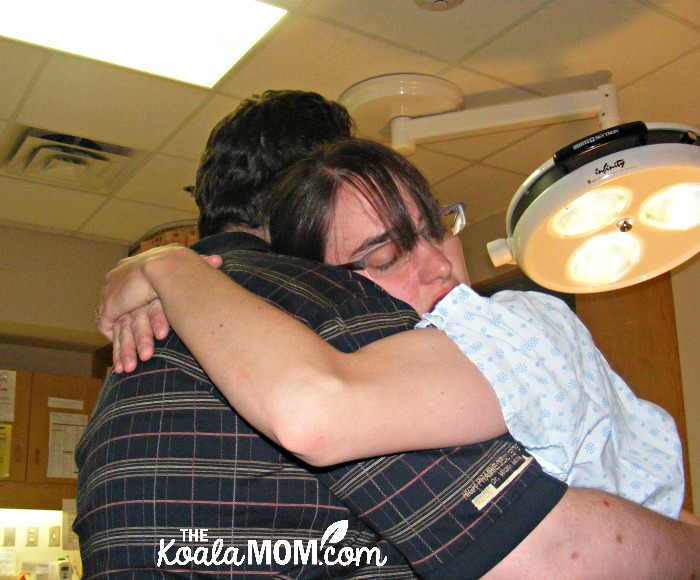Should dads be in the labour and delivery room, present when their children enter the world? While this is common in most hospitals, obstetrician Michel Odent claims it shouldn’t be. In a recent article for the Daily Mail, he said that “the presence of a father in a delivery room is not only unnecessary, but also hinders labour.” I couldn’t disagree more.

My Experience in the Labour & Delivery Room
My husband was with me throughout my labour, except for a couple times when he went out for no more than ten minutes. He got me food and water, encouraged me to eat and drink when it was hard because I was throwing up, talked me through my contractions, ran water in the tub when I wanted it, emptied the bowl when I threw up, got me towels or blankets as I needed them, and just provided emotional support by being there with me.
Only at one point, when I was tired and wanted quiet and there was nothing he could do for me, did I not want him there. He went out for a few minutes to get batteries for the camera. I used that time to rest, knowing he would soon be back with me.
We spent the months before Sunshine’s birth learning all we could and preparing for it. In many ways, my husband was better at this than I was, reminding me that I should stay fit and practice ways to cope with the pain.
When we arrived at the hospital, he had a list of things he could do to help me. He was also good at observing the nurses and midwife to see what else he could do for me. Perhaps without this preparation, a dad would have a harder time in the delivery room and even annoy his wife, but that only adds to the argument that both moms and dads need some birth education.
Birthing Practices of the Past Century
Dr. Odent talks about how birthing practices have changed over the past century. In the 1950s, births happened at home, without dad present. This was perhaps the stereotypical movie example we have, where dad is sent to “boil water” or hang out at the tavern with his buddies while mom does all the hard work with the midwife and perhaps her sister, mother, or friends helping.
In the 1970s, more births were happening in the hospital and women began to ask for their husbands to be present. Dr. Odent attributes this to the loss of the nuclear family; a woman’s mom or sisters were less likely to be able to help, so she turned to her husband for support. Husbands are now expected to hold their wife’s hand through labour and delivery, and perhaps even cut the cord after baby is born.
Dr. Robert Bradley was one of the pioneers of dads in the delivery room. He’s the author of Husband-Coached Childbirth, one of the books that helped us prepare for Sunshine’s birth. Dr. Odent says, “I am more and more convinced that the participation of the father is one of the main reasons for long and difficult labours.” However, Dr. Bradley’s observation was that women did better with their husbands—the men they love and trust—by their side encouraging them.
Why Dads Should Be in the Delivery Room Today
In today’s hospitals, decisions are often made based on what makes the hospital more money rather than what’s best for the woman. Husbands can help ensure their wives get the birth experience that they want. He should be mediating between his wife and the hospital staff, if necessary, insisting on what she needs.
In one case, a woman was doing fine in labour and handling the pain, but a nurse kept coming in to ask if she wanted an epidural yet, and the woman finally gave in. Her husband could have been there to say, “Leave her alone; when she wants an epidural, I’ll call you.”
Dr. Odent says that “a labouring woman needs to be protected against any stimulation of the thinking part of her brain – the neocortex – for labour to proceed with any degree of ease.” Yes; that’s what her husband can do. Dr. Odent says that a “woman in labour needs to be in a private world where she doesn’t have to think or talk.” I certainly go into that world, and my husband helps maintain it.
Both Bradley and Odent say that a labouring woman needs quiet and support. The husband can ensure she gets that, not only from him, but also from the staff. A person in pain does not make good decisions; so her husband, able to be clear-headed and rational, can help her.
In reading through Dr. Odent’s article, I understand what he observes… but I disagree with his conclusion that the answer is to take dads out of the delivery room. I think dads need to be present at birthing classes with their wives. If possible, dads could attend doctor or midwife appointments with their wives. Dads should be actively involved in learning about the birthing process, as my husband was, rather than leaving it up to the moms.
When Dad Shouldn’t Be Present at His Baby’s Birth
A loving, supportive husband who is committed to being there for his wife, understands what is going on, and knows what she wants and needs during this process, will make the birthing process easier for his wife. I can think of only a few situations where Dr. Odent is right—but only a few.
If there are relationship problems between the couple, then perhaps he shouldn’t be there. If there is a past history of trauma surrounding birth (perhaps the loss of a baby), where either the husband or the wife is still struggling with fears and other strong emotions, then perhaps he should be there.
In that case, I hope the woman either has a supportive mother or sister who can be there, or is able to hire a good doula. The rule should neither be “no dads” nor “all dads,” but each couple should make the decision based on their own situation, needs, and capabilities.
However, in most cases, I think that the man who knows and loves his wife better than anyone else is the best person to be at her side during the most difficult thing she will do.
UPDATE: pictures in this post are from our second daughter’s birth. We hired a doula, who helped me during labour but also helped my husband help me (and took pictures for us!). Read the story of our fifth baby’s birth to see how my husband was there for me during a home birth (he’d had lots of practice by then!).
Was your husband present at your baby’s birth? Was it helpful or hindering? What do you think of Dr. Odent’s and Dr. Bradley’s advice?


One Response
I read that Odent article too and just found it plain weird. So unlike a lot of his other work. However, perhaps he is talking more about men who have no clue what to expect, panic at the first sign of their wives’ discomfort, and/or cave in to hospital pressure to Do Things Their Way and thus end up a useless support person…?